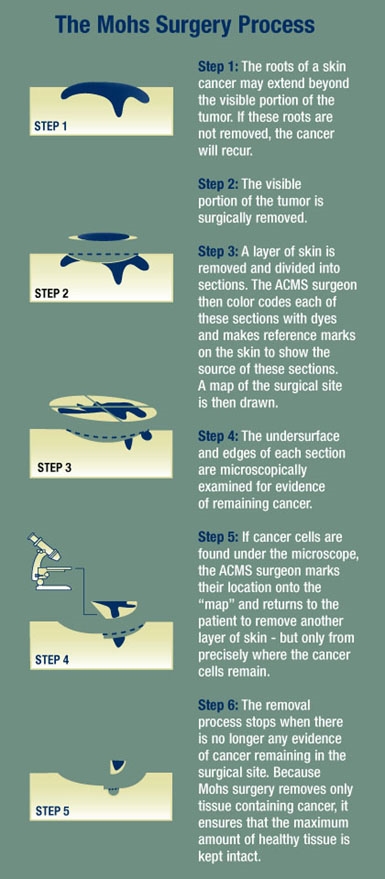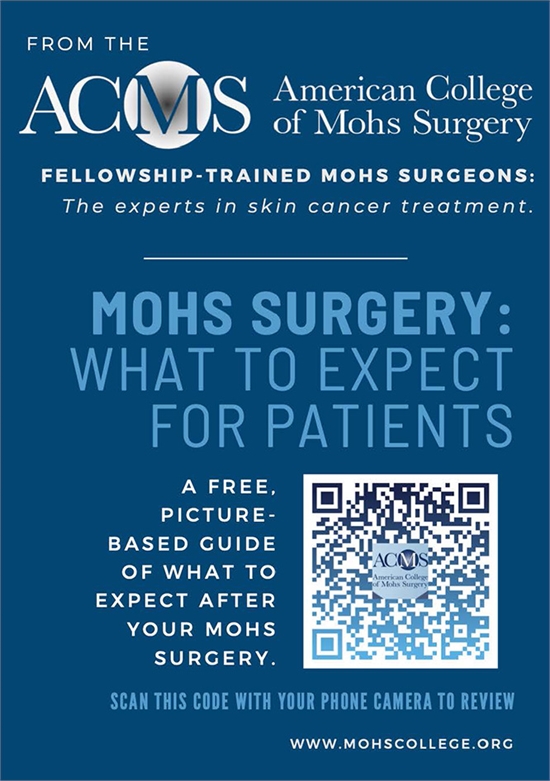
Mohs surgery is a highly specialized treatment for the total removal of skin cancer. Mohs surgery is named in honor of Dr. Frederick Mohs, the physician who developed the technique. This method differs from all other methods of treating skin cancer by the use of complete microscopic examination of all the tissues removed surgically as well as detailed mapping techniques to allow the surgeon to remove every cancer cell.
Mohs surgery is performed by dermatologists who have been formally trained in a program accredited by the American College of Mohs Micrographic Surgery and Cutaneous Oncology (ACMMSCO). Always feel free to ask your doctor about his/her formal training and membership status with the ACMMSCO.
The procedure is begun after the skin is injected with a local anesthetic to completely numb the area. Then, the visible cancer and a very thin layer of skin is removed from that exact location. This may be repeated as often as necessary to completely remove the cancer.
Contact our Dallas, TX office today to schedule your appointment
Frequently Asked Questions
What are the advantages of Mohs Surgery?
By using detailed mapping techniques and complete microscopic control, the Mohs surgeon can pinpoint areas involved with cancer that are otherwise invisible to the naked eye. Therefore, even the smallest microscopic roots of cancer can be removed.
What are my chances for cure?
Using Mohs surgery the percentage of cure is more than 99% for most skin cancer, even when other forms of treatment have failed.
Will I be hospitalized?
No. Mohs surgery is performed in a pleasant outpatient surgical suite and you may return home the same day. Hospital facilities are available if necessary.
Preparing for Surgery
Medications:
Please continue taking any medications prescribed by your doctor(s). While Aspirin may cause bleeding after surgery, if you are taking Aspirin for a heart condition, stroke or blood clot disorder, continue taking your aspirin. The risks of stopping this medication outweigh the risks of bleeding from surgery. You may take Tylenol anytime before surgery if needed for pain.
If you are taking blood thinners such as Coumadin, please call our office before your surgery regarding instructions.
Please feel free to call our office regarding any questions about your medications. In addition, alcohol and caffeine will also promote bleeding, so avoid alcoholic and caffeinated beverages 24 hours before and after surgery.
Women anticipating surgery for facial lesions should not wear cosmetics or perfume.
Transportation:
We suggest that you arrange to have a companion drive you to and from the doctor’s office. You may also be more comfortable with someone to keep you company in the waiting area. We do ask that you bring no more than one person with you to your appointment, so that there will be enough seating for everyone the day of your surgery.
Breakfast:
The day of surgery, we suggest that you eat your normal breakfast, just remember no caffeine.
Arriving for Your Appointment:
Please be on time for your appointment. There is ample parking available. For directions to our office, please click here for a detailed map.
The Day of Surgery
Your appointment will be scheduled for early in the day. Our staff will escort you into a surgical suite where the area around the skin cancer will be numbed. After that, the visible cancer and a thin layer of tissue will be removed. This tissue is carefully mapped and coded by the surgeon and taken to the adjacent laboratory where the technician will immediately process the microscopic slides. You will have a temporary dressing placed over the wound and you will be free to return to the waiting area.
The surgical procedure alone takes only 10-15 minutes. However, it takes a minimum of 1-2 hours to prepare and microscopically examine the tissues. Several surgical stages and microscopic examinations may be required, and you will be asked to wait in the patient waiting area between stages. Although there is no way to tell before surgery how many stages will be necessary, most cancers are removed in three stages or less.
We would like to make the time you spend with us as pleasant as possible. You may want to bring reading material to occupy your time while waiting for the microscopic slides to be processed and examined. Magazines and snacks will be available in the waiting area. If your visit extends through the lunch hour, your companion may visit the hospital cafeteria, or an area restaurant, or you may choose to bring a sack lunch with you.

The most difficult part of the procedure is waiting for the results of the surgery. Since we do not know in advance how much time is necessary to remove the cancer and repair the wound, we ask that you make no other commitments for the entire day that you are scheduled for the surgery.
Will the Surgery Leave a Scar?
Yes. Any form of treatment will leave a scar. However, because Mohs surgery removes as little normal tissue as possible, scarring is minimized. Immediately after the cancer is removed, we may choose 1) to leave the wound to heal itself, 2) repair the wound with stitches, or 3) to reconstruct the wound with a skin graft or flap. This decision is based on the safest method that will provide the best cosmetic result.
Will I Have Pain After Surgery?
Most patients do not complain of pain. If there is any discomfort, Tylenol is all that is usually necessary for relief. Avoid taking aspirin containing medications as they may cause bleeding.
After Surgery
Will I Need to Return?
Usually one return visit is all that is needed to examine the healed surgical site or to remove stitches. Afterwards, you may return to your referring physician for routine check-ups. A follow-up period of five years for the treated cancer is essential. After having one skin cancer, statistics show that you have a higher chance of developing a second skin cancer. You should have your skin checked by your referring physician at least once each year, not only to examine the treated skin cancer, but also to check for new skin cancers.
Digital Flipbook for Patients Now Available
Before and After Mohs Surgery: What to Expect for Patients Before and After Mohs Surgery: What to Expect for Patients is a digital flipbook to inform patients on common postoperative healing scenarios such as normal inflammation around an incision, spitting suture, flap pin-cushioning, pigmentary changes, and much more. It also provides a brief explanation of the unique expertise and value of having a fellowship-trained Mohs surgeon.
Use your camera phone to scan the QR code or click the image below to view



